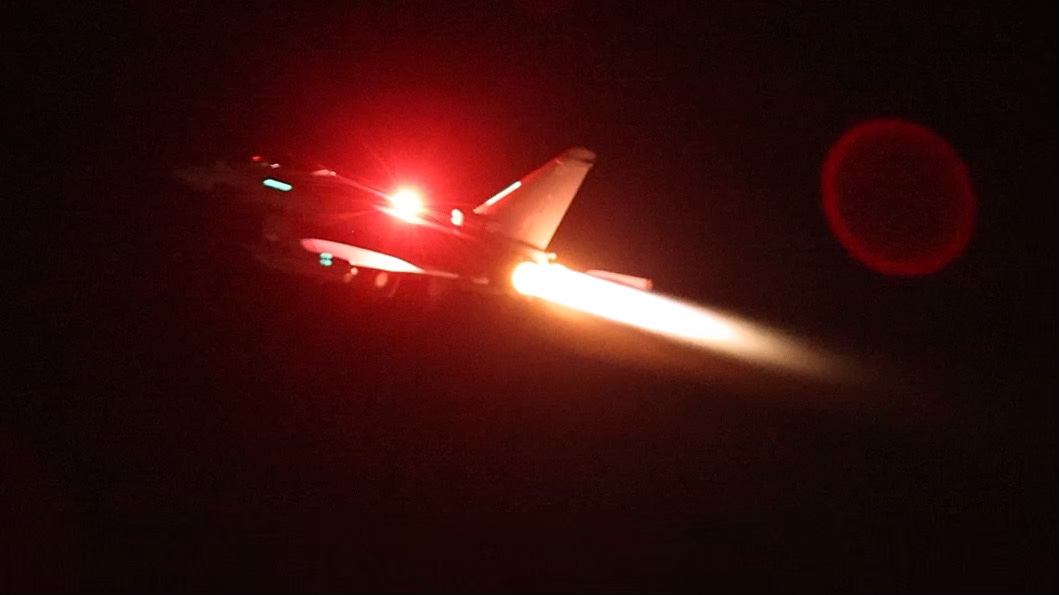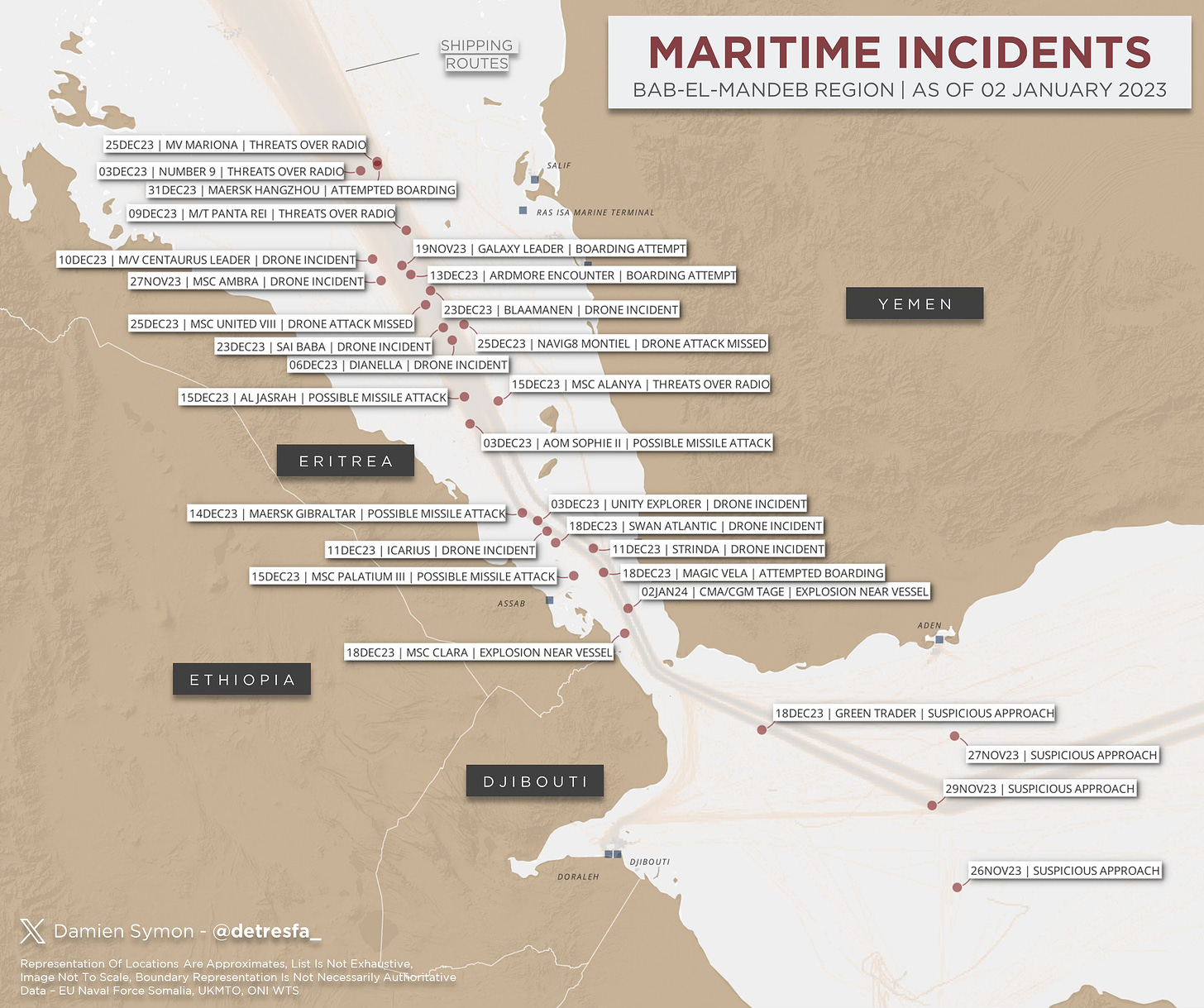It's On Against the Houthis
The U.S. leads strikes against the Houthi intelligence-strike complex

With the war in Gaza nearing its 100th day, the Houthi assaults on vessels in the Red Sea underscore the intricate nature of this conflict and the need to carefully contain it and prevent its escalation beyond its current boundaries.
Dr. Scott Romaniuk & Professor Christian Kaunert
Today, a U.S.-led force conducted a range of military strikes against targets in Houthi controlled areas designed to degrade their ability to interdict maritime trade in the Bab-El-Mandeb region of the vital red Sea trading route. As a the media release from the U.S. Department of Defense notes, “this action is intended to disrupt and degrade the Houthis' capabilities to endanger mariners and threaten global trade in one of the world's most critical waterways.”
For weeks, the Houthis had engaged in an escalated campaign of missile, drone and surface attacks against shipping in the region. As the map below shows, this was a comprehensive campaign which exploited the war in Gaza to attack shipping and send missiles towards Israel.
According to a report in the Washington Post, the attacks comprised of “a consortium of military aircraft and naval assets, including submarines…They took out Houthi air defenses before targeting radars and facilities used to store and launch unmanned aircraft, cruise missiles and ballistic missiles.”
The Houthis were certainly warned. In a joint statement from the governments of the United States, Australia, Bahrain, Belgium, Canada, Denmark, Germany, Italy, Japan, Netherlands, New Zealand, Republic of Korea, Singapore, and the United Kingdom on 3 January, they stated that:
We call for the immediate end of these illegal attacks and release of unlawfully detained vessels and crews. The Houthis will bear the responsibility of the consequences should they continue to threaten lives, the global economy, and free flow of commerce in the region’s critical waterways.
There is still considerable ambiguity about this strike campaign. We are yet to understand how comprehensive or how successful the initial strikes have been. And we are yet to see whether this is a one off, or part of a much broader campaign against the Houthis.
At this early stage, there are several issues which are worth considering.
1. Single Strike or Extended Campaign? The strikes conducted today will have had an impact on the Houthi missile capability, including their ability to collect intelligence and targetting data. But it is very unlikely that a single strike will significantly change the situation. Despite the precision of modern weapon systems, not every target is found before strikes such as this, and not every target will have been effectively neutralised. While battle damage assessment will already be underway by U.S. military, we should assume that follow up strikes will be needed.
One of the key lessons from recent conflicts in Gaza and Ukraine is that there are no magic bullets in war, and conflicts are no longer decided in a single engagement. The Houthis have a significant quantity of missiles, drones and other weapon systems. Potentially, the neutralisation of the Houthi capability or will to interdict shipping routes might require a strike campaign over days (or weeks).
2. What Are The Strategic Objectives? The U.S. and its partners had little choice but to conduct these strikes. Its actions to peacefully resolve the situation had not succeeded, there was a need to ‘re-establish deterrence’ against the interdiction of maritime trade in a vital international trading route. Despite this, the strategic objectives of the U.S. and its partners will be important. As the Biden administration has demonstrated in Ukraine and Gaza, it is very cautious about escalation.
This mindset will impact how expansive the strategic aims of the new campaign against the Houthis are. With major conflicts raging in Ukraine and Gaza, and significant tensions likely after Taiwan’s elections, Western governments will be hopeful that this situation with the Houthis can be resolved quickly. Therefore they are likely to have limited strategic aims. This is unlikely to be the start of a major initiative to dismantle the Houthis.
Therefore the question of whether this is just a few limited strikes in the hope the Houthis negotiate and stop the strikes, or a longer series of strikes or part of something more significant, is pertinent. The answer will provide insights into the strategic aims of the U.S. While the U.S. will hope for the former, it needs to be prepared for the latter. And, it is unlikely that the U.S. Navy is prepared for anything other than a short term commitment in the region, given the likelihood of increased tensions in the Western Pacific in the wake of the election in Taiwan tomorrow.
3. Messaging Iran. Undoubtedly, part of the rationale for the strikes is also sending a message to Iran. Iran is the backer for Hamas, Hezbollah and the Houthis (the bad ‘H’s), and the U.S. will also be hoping that these strikes send a message to Iran to back off. However, this is unlikely. Recent U.S. strikes across the region against other Iranian proxies have not had a major impact on Iranian operations to support its terrorist brothers and their operations across the region.
4. Tackling the Iran Problem. At some point, the West may have to address the Iran threat directly rather than attacking its proxies. While this is not an immediate prospect, Iran may actually force the West into a confrontation if it continues its support for enhanced attacks by its proxy forces against Israel, the U.S. and other nations. Ultimately, Iran is the backer for almost all the terrorist organisations that are causing instability in the middle east at present.
5. How will the Houthis react? It is probably unlikely that these strikes will cause the Houthis to back down, at least immediately. They might respond by further attacks against civilian and military vessels, expand the attacks (for example by using sea mines as well as missiles and drones) or even conduct attacks against Saudi oil infrastructure as they have in the past.
The Houthis are also almost certain to use information warfare, claiming the strikes killed innocent civilians, to turn opinion in the Middle East against the US and UK.
Initial indications are that the Houthis are not backing down just yet. The Houthi deputy foreign minister, Hussein al-Ezzi stated after the strikes that the U.S. and the U.K. would face “severe repercussions” for what he termed a blatant act of aggression. CNN reports al-Ezzi describing how:
Our country was subjected to a massive aggressive attack by American and British ships, submarines, and warplanes, and America and Britain will undoubtedly have to prepare to pay a heavy price and bear all the dire consequences of this blatant aggression.
6. How Will The Region React? The Houthis are hardly winning a popularity contest in the region. They have attacked targets in Saudi Arabia and have grown increasingly indiscriminate in their attacks on civilian shipping in the crucial Red Sea trade route. it will be interesting to see how regional nations react, and how this influences Houthi and U.S. decision-making about their responses and future actions.
It’s Not Over Yet
In his statement in the wake of these attacks, President Biden notes that “I will not hesitate to direct further measures to protect our people and the free flow of international commerce as necessary.” We are clearly in the early days of what could be a more significant campaign. The U.S. is obviously prepared for subsequent military action against the Houthis should they continue to attack shipping and other targets across the Middle East.
We should beware. The Houthis have demonstrated significant resilience and military capability until this point. We should not assume they will be a pushover in this new conflict.





This was written in 1997: "The Moscow-Teheran Axis
The most ambitious and complex part of Dugin's program concerns the South, where the focal point is a Moscow-Teheran axis. "The idea of a continental Russian-Islamic alliance," he writes, "lies at the foundation of anti-Atlanticist strategy. [T]his alliance is based on the traditional character of Russian and Islamic civilization" (158). "On the whole," he continues, "the entire Islamic zone represents a naturally friendly geopolitical reality in relation to the Eurasian Empire, since the Islamic tradition ... fully understands the spiritual incompatibility of America and religion. The Atlanticists themselves see the Islamic world, on the whole, as their potential opponent" (239).
As the result of an especially broad Grand Alliance to be concluded with Iran, Dugin maintins that Eurasia-Russia will enjoy the prospect of realizing a centuries-old Russian dream and finally reach the "warm seas" of the Indian Ocean. "In relation to the South," he writes, "the 'geopolitical axis of history' [Russia] has only one imperative--geopolitical expansion to the shores of the Indian Ocean" (341). "Having received geopolitical access--in the first place, naval bases--on the Iranian shores," he writes, "Eurasia will enjoy full security from the strategy of the 'Anaconda ring'" (241). Eurasia-Russia and the Empire of Iran, he emphasizes, will have "one and the same geopolitical tendency" (242)." https://tec.fsi.stanford.edu/docs/aleksandr-dugins-foundations-geopolitics
If you look at the rest of the article, Putin appears to be following Dugin's prescriptions pretty closely.
The Houthis made a suicidal move here. 11 nations. It's important to note the goals: they WANT dead Muslim civilians; to unite 1 bn in an apocalyptic war. Believe ALL Muslims should all be willing to go to heaven to further their cause. This doesn't get enough play here; its not the western nations fault when civilians die. They are hiding in and launching attacks from populated areas for a reason. This is not a noble fight their engaged with of fighters vs military. They target civilians dare the enemy to hit them back hiding in cities and then broadcast the inevitable deaths.